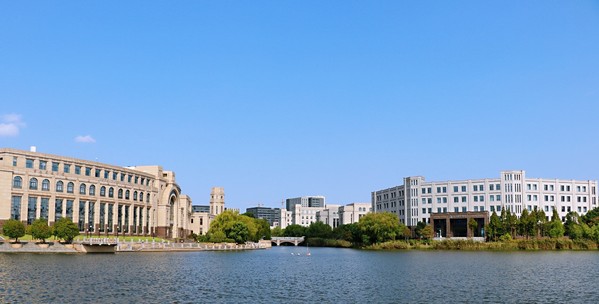为进一步完善学科体系,加强地球科学领域的国际学术竞争力,提升为国家经济社会发展的贡献能力,复旦大学于2016年4月29日和2018年4月20日分别成立了大气科学研究院和大气与海洋科学系,由中国科学院院士张人禾教授担任院长、系主任。大气与海洋科学系是上海市首家大气与海洋学科相结合的人才培养基地。
我们注重发挥复旦的综合性大学优势,积极开展与数学、力学、物理、化学、计算机科学等领域的学科交叉发展。目前大气与海洋科学系设立了气象学与大气环境、气候系统和气候变化、大气物理和化学过程、海洋气象学与物理海洋四个学科方向。
复旦大学的本科生和研究生生源均名列全国前茅。大气与海洋科学系/大气科学研究院建立了包括本科、硕士、博士和博士后的完整人才培养体系。我们通过引进相关学科带头人、整合校内现有的相关学术力量,积极组建具有国际水平的研究团队,追求强化科研创新,培育一流科研成果。目前,获国家自然科学基金委重大项目1项、重点项目4项、重大研发计划重点项目2项、国家重点研发计划1项、广东省重点研发计划1项、上海市重点项目1项;主持在研项目经费达1个多亿人民币;高水平论文发表500多篇,其中第一作者或通讯作者近150多篇;共举办大气海洋科学论坛讲座近190场,AOS论坛40多期;荣获2020年度科技工作先进单位:“人均科技综合产出最高”以及“与前三年相比科技综合产出增长最快”。
大气与海洋科学系/大气科学研究院加快基地建设,促进局校合作,打造高水平科研平台。现建有省部级平台 — “上海市海洋-大气相互作用前沿科学研究基地”和“中国气象局-复旦大学海洋气象灾害联合实验室”,国际合作交流平台 — 中国大陆首个“复旦大学国际灾害风险综合研究计划国际卓越中心(IRDR)”和“MAP-AQ上海办公室”。同时,我们还分别与复旦大学大数据学院联合建立了“上海能源与碳中和战略研究院”,与上海市气象局建立了“复旦大学大气科学学科实习基地”,与珠海复旦创新研究院成立“海气系统监测预测中心”,并和上海期智研究院建立了“气象大数据与人工智能交叉研究”合作等。未来,我们将继续围绕全球气候变化、国家“一带一路”等国际战略,不断拓展与国际一流高校等研究机构的科研合作,联合开展和实施重大科学计划,充分利用学校国际交流工作推进机制、激励机制和保障机制,进一步强化大气科学和物理海洋学学科国际化人才培养和科学研究。

▲ 大气与海洋科学系-江湾校区观测场
复旦大学大气观测站已经建成使用,它是我系建立的第一个集科研、教学、科普等功能于一体的大气综合探测平台,具备常规气象要素、大气环境、边界层湍流结构等多要素的同步监测,为院系教学实验中心的建立奠定了基础,为教学实验课程提供了有力保障。同时,复旦大学和上海市气象局联合共建“长三角大气-环境-生态综合观测基地”,与同济大学等多家科研单位在东海海域共同建设“东海大气海洋探测超级观测站”,为大气探测研究和海洋气象科学研究提供了重要平台,极大地推动了局校优势资源互补和数据共享。
大气与海洋科学系/大气科学研究院现有教职工48人,其中全职教学、科研人员35人,管理技术人员11人。教学科研人员包括特聘教授13人(含中国科学院院士2人、国家杰出青年科学基金获得者4人),教授、青年研究员13人,副教授、青年副研究员9人。另外还有讲座教授1人、教授级高级工程师1人。
一流的学科发展离不开一流的人才,大气与海洋科学系/大气科学研究院秉承事业引人、待遇引人、感情引人的理念制定了高水平人才引进政策,遵照复旦大学教职工民生工程,努力整合和优化校内资源,不断完善住房、子女教育、医疗等生活条件支持,为每位优秀人才提供良好的工作环境和生活保障。

▲ 江湾校区
Introduction to the ForumYoung Scholars are the future of academic research. Fudan-Guanghua International Forum for Young Scholars aims to create communication platforms for global young talented scholars of various research fields to discuss cutting-edge research spotlights, to resolve frontier academic problems and to enhance cooperation among distinct disciplines. The Forum also offers young scholars a taste of research environment and a package of know-how for research in China, specifically at Fudan University. It would eventually foster the “Extraordinary 2025” Elite Project and “Super Postdoctoral” Proposals to help attract from world-wide young researchers to work at Fudan University.
Sub-Forum of is hosted by Department of Atmospheric and Oceanic Sciences & Institute of Atmospheric Sciences, Fudan University. It will be held in the middle of January 2022, including the following four academic fields:
1.Meteorology and Atmospheric Environment
2.Climate system and Climate Change
3.Atmospheric Physical and Chemical Processes
4.Physical Oceanography and Atomsphere-Ocean Interaction.
Faculties
1. Age below 40
2. Ph.D. degree
3. Have remarkable achievements and great potentials in specific research area
Super Postdoctoral Proposals
1. Generally under 35 years old
2. Ph.D. candidates or Ph.D. holders generally within 3 years of graduation
3. With outstanding achievements
Please send your detailed resume (including educational background, scientific research achievements and research plans, list of published articles, etc.) to the following Email Address by 25th Dec,2021:
hongll@fudan.edu.cn (Miss Li)
For more information, please contact: (86)-21-31248806

Department of Atmospheric and Oceanic Sciences/Institute of Atmospheric Sciences of Fudan University
To improve the system of academic disciplines, increase the international academic competitiveness of Fudan University (FDU) in geoscience and make a greater contribution to China’s economic and social development, FDU established the Institute of Atmospheric Sciences on 29 April 2016 and the Department of Atmospheric and Oceanic Sciences on 20 April 2018, headed by Professor Zhang Renhe as Dean and Director who is an academician of the Chinese Academy of Sciences (CAS). The Department of Atmospheric and Oceanic Sciences is the first institution founded in Shanghai that nurtures talents specializing in both atmospheric and oceanic sciences.
We have been building on the advantages of FDU as a comprehensive university to achieve interdisciplinary development that integrates atmospheric and oceanic sciences with mathematics, mechanics, physics, chemistry and computer science. The Department provides four academic fields of study: Meteorology and Atmospheric Environment, Climate System and Climate Change, Atmospheric Physical and Chemical Processes, as well as Marine Meteorology and Physical Oceanography.
FDU’s undergraduates and postgraduates are all sourced from some of the top schools across China. The Department/Institute has put in place a system of talent development that provides bachelors, masters, doctoral and postdoctoral programs. For the past, we have recruited some researchers for leading academic research and integrated FDU’s existing academic researchers to build a world-class research team in pursuit of more innovation and leading outcomes in scientific research. As of now, we have undertaken 1 major project, 4 key projects, 2 key projects of major research and development, and 1 national key research and development programs funded by the National Natural Science Foundation of China; 1 key research and development program of Guangdong Province and 1 key project of Shanghai; received a total budget of over 100 million yuan for working on existing research projects; published more than 500 papers in high-level journals, among which over 150 papers were contributed by our faculty as either the first author or the corresponding author, held around 190 lectures on atmospheric and oceanic sciences and over 40 sessions of the AOS Forum, and was awarded the leading organization for scientific and technological research of 2020 that has “the Highest per Capita Scientific and Technological Output” and “the Fastest Scientific and Technological Output in 2020 compared to the Previous ThreeYears”.
The Department/Institute has made faster headway in building bases to promote cooperation with the meteorological authorities and establish high-level platforms for scientific research. It has two provincial/ministerial platforms - “Shanghai Frontiers Science Center of Atmosphere-Ocean Interaction” and “China Meteorological Administration - Fudan University Laboratory of Marine Meteorology”, and two platforms for international cooperation and communication - “Fudan University Integrated Research on Disaster Risk International Center of Excellence” and “MAP-AQ Shanghai Office”. In the meantime, we have also established Shanghai Strategy Research Institute of Energy and Carbon Neutralization in conjunction with the FDU School of Big Data, the Fudan University Atmospheric Science Internship Base in conjunction with the Shanghai Meteorological Service, the Oceanic and Atmospheric System Monitoring and Forecast Center in conjunction with the Zhuhai Fudan Innovation Research Institute, and the cooperation in “Atmospheric Big Data and AI Interdisciplinary Research” with the Shanghai Qi Zhi Institute. Going forward, we will continue to follow international strategies of climate change and the “Belt and Road Initiative” to keep expanding cooperation in scientific research and launch and implement major scientific initiatives with the world’s leading universities and research institutions, and further enhance international talent development and scientific research in Atmospheric Sciences and Physical Oceanography.
The Atmospheric Observatory of FDU has been put into operation, which is the first integrated platform of exploring the atmosphere that our department has established for the purposes of scientific research, instruction and scientific popularization. It supports synchronous monitoring of regular meteorological elements, the atmospheric environment and the structure of turbulent boundary layers, which has laid the groundwork for the establishment of an instructional experiment center and ensured the delivery of instructional experiment courses. At the same time, FDU and the Shanghai Meteorological Service have jointly established an “Observatory for Monitoring the Atmosphere, Environment and Ecology in the Yangtze River Delta”, and it has established a “Super Observatory in the East China Sea for Exploring the Atmosphere and Ocean” in the area in collaboration with Tongji University and other scientific research institutions. As important platforms for research in atmospheric exploration and marine meteorology, the two observatories have significantly boosted the resource complementation and data sharing with the meteorological authorities.
The Department/Institute now has 48 faculty members, of whom 35 are full-time instructors and scientific researchers and 11 are administrative or technical staff. Our instructors and scientific researchers include 13 distinguished professors (including 2 CAS academicians and 4 scholars recognized by the National Science Fund for Distinguished Young Scholars), 13 professors and young research fellows and 9 associate professors and young associate research fellows. In addition, we also have 1 chair professor and 1 professor-level senior engineer.
An academic discipline wouldn’t develop to a leading level without leading talents. The Department/Institute has developed policies for bringing in high-level talents based on the philosophy of sourcing talents with good career development, remuneration and humanism, and aligned with the FDU project for providing its faculty with better livelihoods in an effort to integrate and optimize its resources and offer the faculty better housing, education of their children and health care, so that every talent can enjoy a good working environment and better livelihoods.